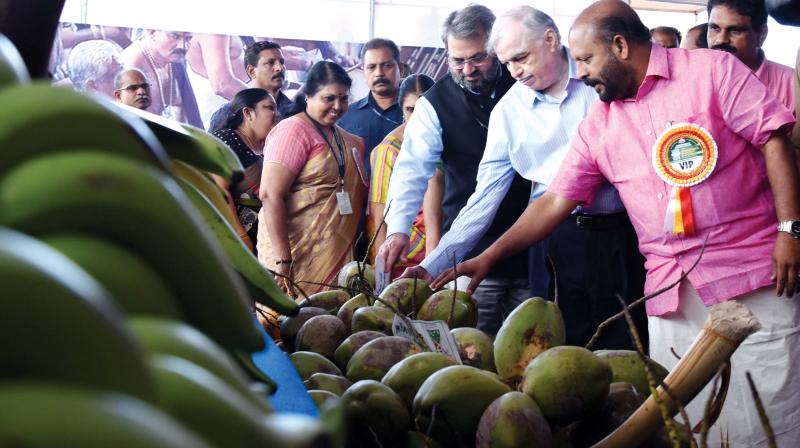GAP boost for organic farming

THIRUVANANTHAPURAM: The state government has moved to Good Agricultural Practices (GAP) and Value Addition for Income Generation in Agriculture (VAIGA). As part of delivering quality organic vegetables to consumers, only produce that comes under GAP has been sold at festival markets during the last one-and-a-half years.
As the people have become conscious of pesticide-laced vegetables and fruits, the government has moved to GAP and VAIGA. The drawback of GAP is that a certain level of pesticides, fungicides and chemical fertilisers can be used.
"GAP is not effective as the officials do not have direct control over the use of chemical fertilizers being applied. The norm is that agricultural officers should visit the farmers at 8 a.m. when they spray the chemical fertilizers," said a senior agriculture department official.
Over the last two years, the agriculture department has moved to VAIGA. Agriculture minister V. S. Sunil Kumar claimed that the latest edition of VAIGA exhibition held in Thrissur which concluded on New Year's eve was a success. He wanted to make Thrissur a permanent venue due to the proximity of the agricultural experts at Kerala Agriculture University, Vellanikkara.
He refuted the claims of his department official that the LDF government had forgotten organic farming citing that a team of officials had gone on a field trip to West Godavari in Andhra Pradesh in November. The delegation also comprised former chief secretary S. M. Vijayanand, one of the architects of Kerala's democratic decentralisation initiative, T. N. Seema, CEO of Haritha Keralam Mission, Teeka Ram Meena, principal secretary (agriculture) and agricultural production commissioner and a team of agriculture department and KAU scientists.
"After seeing their organic farming, the delegation was happy with the strides Kerala has made. There is a dearth of quality manure. Along with decentralisation, micro- nutrients should also be provided," said Mr Sunil Kumar.
He hopes that another batch of 136 agriculture department officials who will pass out from the National Institute of Plant Health Management Institute at Hyderabad with a PG diploma in plant health management will provide training to farmers in organic farming. Already 106 officials from the state are engaged in training farmers.
T. S. Thaju, an organic farmer at Koduvayoor in Palakkad, told DC that not even organic pesticides should be used as even tobacco leaves are poisonous. Only Quicklime, natural cow dung and dried leaves should be used for farming of fruits and vegetables at homesteads or at commercial level.
As per the Economic Review of 2016, awareness creation of Participation Guarantee System (PGS) to promote organic farming was undertaken and 200 local groups were formed, including 1,500 farmers, and 1,000 acres of cultivation was brought under the same during the period. An assessment of the impact of interventions in organic farming on the farmers' well-being, economy and environment in the state as envisaged in the organic farming policy (2010) is required to "reorient the strategies and to evolve suitable action plan" for promoting organic farming in Kerala, it says.
"Strengthening of PGS, GAP, quality control laboratories and other certification and incentive system will be worked out to promote organic and nature friendly farming in Kerala", says the ER.
An organic farming policy, strategy and detailed action plan were envisaged in 2010 to cover potential areas in Kasargod and other districts. Under this programme, 100 vermi compost units, 625 rural compost units, 30 demonstration plots and 42 ecoshops were established in 13 districts. Also the existing 200 clusters were strengthened and 50 new clusters formed. During 2015-16, 339 vermi compost units were established under organic farming by the State Horticulture Mission and an area of 3,000 hectares was brought under organic certification.

